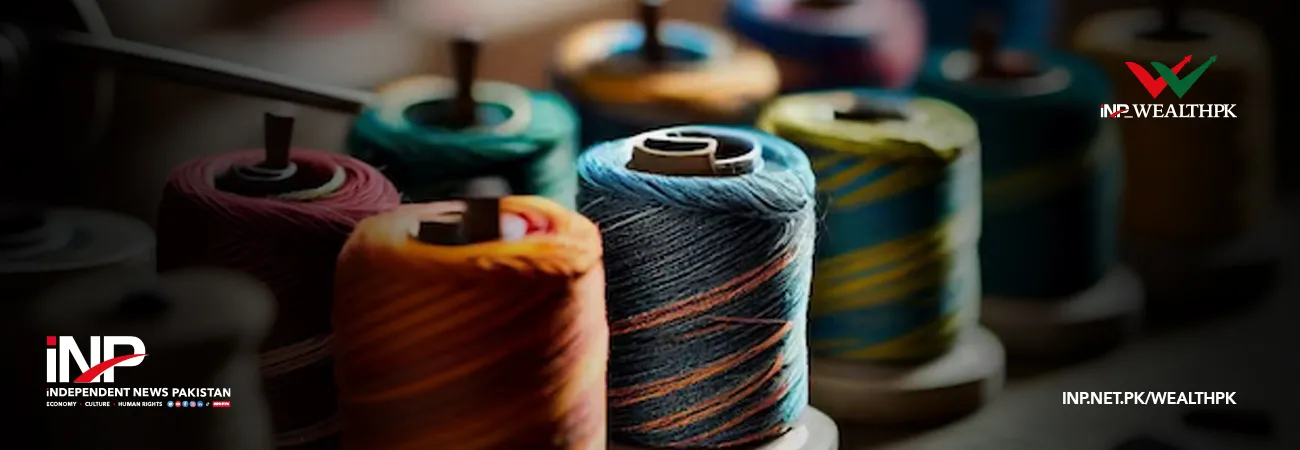INP-WealthPk
China-Pakistan Economic Corridor (CPEC) is playing a crucial role in taking the Pakistan’s textile industry to the next level.
Textile is Pakistan's largest manufacturing industry, contributing significantly to the country's GDP and employment.
WealthPK’s report aims to discuss the crucial role of CPEC in elevating Pakistan's textile industry to new heights.
Overview of textile industry in Pakistan
The textile industry in Pakistan is vertically integrated, covering the entire textile value chain, from cotton ginning to finished products. However, the industry is facing several challenges, including high energy costs, obsolete machinery, low productivity and intense competition from other textile-producing countries. To overcome these challenges, the textile industry needs to modernise its machinery, improve productivity, and explore new export markets.
Under CPEC, several projects have been initiated in collaboration with China to help boost the textile industry. Some of these projects are as follows:
Textile City in Faisalabad
The Textile City Faisalabad is a joint venture between Pakistan and China, covering an area of 1,000 acres. The project includes facilities for spinning, weaving, dyeing, printing and finishing of textiles. The estimated cost of the project is around $1 billion, and it is expected to create job opportunities for around 300,000 people.
Industrial Park in Lahore
Chinese company Challenge Fashion is investing $150 million in an industrial park on Lahore's border with Kasur district. The industrial park will house fabric units, dyeing facilities and garment manufacturing units for exporting sportswear to the Americas, Europe, Asia-Pacific and other regions of the world. Challenge Fashion plans to make the industrial park a regional supply chain park by inviting more Chinese accessory companies to produce zippers, labels, buttons, etc. The company currently employs around 3,000 workers, including 28 Chinese nationals, and expects to create nearly 10,000-11,000 new jobs once the industrial park becomes fully functional. The company estimates that in five years, it can reach around $400 million in export revenue.
Garment City Kasur
Garment City Kasur is being established over an area of 400 acres of land. The project is being supported by China Railway, which has committed to investing $500 million in the initiative. This investment is expected to create around 3,000 job opportunities for the people of Pakistan. The project aims to enhance the country's textile and garment industry by providing a state-of-the-art manufacturing and production hub. The Garment City will offer various facilities, including advanced machinery, training centres, and research and development facilities, to support the growth of the textile and garment industry in Pakistan. The project is part of the larger CPEC initiative, which aims to develop infrastructure and promote trade and investment between China and Pakistan.
Textile Industrial Park in M3 Industrial Estate
The Textile Industrial Park is located in the M3 Industrial Estate in Faisalabad and covers an area of 4,500 acres of land. The project includes facilities for spinning, weaving, dyeing, printing, and finishing of textiles. A Chinese group has purchased about one-fourth of the land in this zone and is expected to make an investment of $2 billion to set up a big cotton spinning facility and it is expected to create job opportunities for around 200,000 people.
CPEC and textile industry in Pakistan
The textile industry in Pakistan stands to benefit from CPEC in many ways.
Infrastructure development
CPEC aims to improve Pakistan's transportation and energy infrastructure, which will reduce the cost of doing business. CPEC includes the construction of new highways, motorways, railways, and ports, which will make it easier for the textile industry to transport goods domestically and internationally. Additionally, under CPEC, work on a number of power projects has been undertaken to help address the energy shortages in Pakistan and reduce the cost of electricity for the textile industry.
Trade opportunities
CPEC provides Pakistan's textile industry with new trade opportunities as it aims to create an economic corridor between China and Pakistan, which will improve trade between the two countries. China is the largest textile exporter in the world, and Pakistan can benefit from its expertise and technology in the textile industry. Additionally, CPEC provides Pakistan with access to new markets, such as Central Asia and the Middle East, which can increase Pakistan's textile exports.
Investment opportunities
CPEC provides Pakistan's textile industry with new investment opportunities as it includes the development of Special Economic Zones (SEZs), which will provide tax incentives, infrastructure and other facilities to attract foreign investment. The SEZs will create new opportunities for joint ventures and partnerships between Pakistani and Chinese companies in the textile industry. Additionally, CPEC includes the development of Gwadar Port, which will attract investment in the textile industry by providing access to new markets and reducing transportation costs.
Technology transfer
CPEC provides Pakistan's textile industry with new technology transfer opportunities. CPEC includes the development of industrial parks and technology transfer centres, which will provide Pakistani companies with access to Chinese technology and expertise in the textile industry. Additionally, CPEC provides opportunities for Pakistani companies to collaborate with Chinese counterparts in research and development, which can improve the productivity and quality of Pakistan's textile industry.
According to Pakistan Textile Exporters Association (PTEA), CPEC is expected to increase Pakistan's textile exports to China by 50% in the next few years.
The All-Pakistan Textile Mills Association is building a 50MW coal-fired power plant in Faisalabad under CPEC to provide cheap electricity to the textile mills in the city to help improve their competitiveness.
Credit: INP-WealthPk




